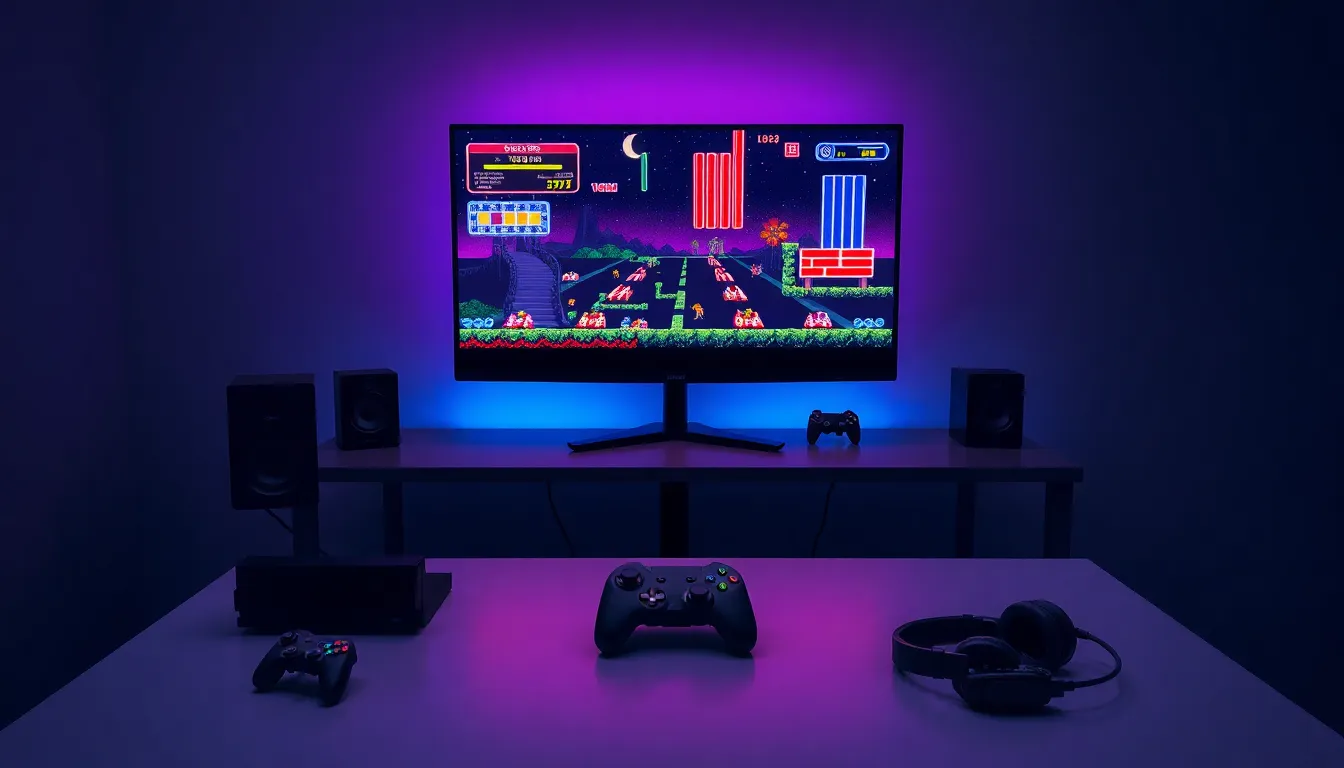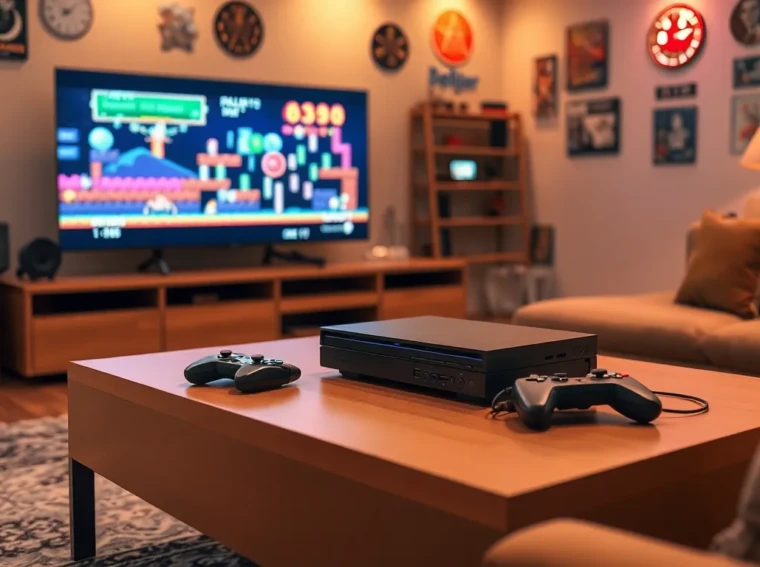In a world where nostalgia meets modern technology, game emulator consoles have become the ultimate playground for gamers. Imagine reliving those epic battles and pixelated adventures without the hassle of dusting off old cartridges or wrestling with outdated hardware. It’s like having a time machine that fits right in your living room—minus the awkward conversations with your past self.
Best Game Emulator Console
Game emulators serve as software or hardware solutions that replicate the functions of gaming consoles. These emulators grant users access to games from various gaming systems, enabling them to play titles that might otherwise be inaccessible. Through game emulation, players enjoy a wide range of nostalgic and classic games without relying on original cartridges or outdated hardware.
Positive attributes of game emulators include enhanced graphics, customizable controls, and the capacity for save states. Users can increase resolutions and apply filtering options, which improve the visual experience compared to original hardware. Customizable controls offer flexibility, allowing players to adapt gameplay to their preferences.
Notable examples of popular game emulators include RetroArch and ZSNES. RetroArch supports multiple systems, including NES, SNES, and Sega Genesis. ZSNES focuses primarily on Super Nintendo games, offering a user-friendly interface conducive to casual gamers.
Compatibility depends on the emulator, as some support only specific games or systems. Factors such as performance and stability also play critical roles in selecting the most suitable emulator for individual needs. In recent years, hardware solutions like the Analogue Super NT embody a growing trend of dedicated consoles built for seamless retro gaming experiences.
Security concerns accompany the use of game emulators, primarily regarding the legality of ROM files. Users must ensure compliance with intellectual property laws, as downloading ROMs for games they do not own legally poses risks. Understanding these legalities remains essential for responsible gaming.
The landscape of game emulators continues evolving, bringing new technologies and features to enhance user experiences. As innovation persists, gamers will find expanded opportunities to enjoy classic titles across various platforms.
Features To Consider In A Game Emulator Console

Selecting a game emulator console involves evaluating key features that enhance the overall gaming experience. Two critical aspects include compatibility and performance, which significantly impact usability and enjoyment.
Compatibility
Compatibility stands out as a primary consideration. An ideal emulator console supports a wide range of games across various platforms. Users benefit from consoles that can run multiple systems without restrictions, providing access to extensive game libraries. Check for compatibility with the most beloved classics, as well as support for less common titles. Also, consider the emulator’s ability to handle different file formats, ensuring ease of use when loading games. Retailers or reviewers might highlight how certain emulators excel in supporting several gaming systems, offering gamers flexibility in their gaming choices.
Performance
Performance directly influences gameplay quality. Emulators that offer smooth graphics and fast load times enhance user satisfaction considerably. Gamers appreciate those consoles that minimize lag or stutter during intense gameplay, enabling seamless action. Look for features such as upscaled resolution or enhanced audio to elevate the gaming experience. Furthermore, the processing power of the console dictates its ability to run advanced emulation without crashing or freezing. Analyze factors like frame rates and refresh rates, as these details contribute to an immersive retro gaming environment.
Top Game Emulator Consoles
Game emulator consoles enable access to a variety of classic titles, enhancing nostalgia for retro gaming. Here are some of the best options available today.
Console 1: Features and Benefits
The Analogue Super NT excels in providing a premium experience for Super Nintendo enthusiasts. This console features HDMI output for crystal-clear visuals, restoring original graphics with true-to-life colors. Users appreciate its support for Super Nintendo cartridges, allowing seamless play without downgrading quality. Enhanced audio options ensure the classic soundtracks are delivered with clarity. Customizable control schemes add versatility for different gaming preferences, making it a top choice for retro gaming aficionados.
Console 2: Features and Benefits
The RetroPie platform impresses many with its user-friendly interface and extensive library support. Offering compatibility with a multitude of gaming systems, it caters to varied gaming tastes. This console allows users to emulate everything from arcade classics to 16-bit adventures, all on one device. Gamers enjoy easy configuration, enabling rapid setup to start playing quickly. Additional features like save states and graphics enhancement options improve the gameplay further, enhancing the overall experience.
Console 3: Features and Benefits
The Nintendo Switch has become popular for its unique blend of portability and compatibility. Gamers can enjoy classic titles through various emulation apps available on the device. Its robust hardware handles multiple gaming systems smoothly, providing high-quality graphics and fast loading times. Features like online multiplayer capabilities enrich the gaming experience, catering to social gaming enthusiasts. A wide selection of both retro and modern games ensures players get the most from their gaming sessions.
How To Set Up Your Emulator Console
Setting up an emulator console involves several steps for an optimal gaming experience. Follow these simple instructions to get started.
Step-by-Step Installation Guide
- Choose an emulator console that meets gaming needs. Options include the Analogue Super NT or RetroPie.
- Download the emulator software from the official website. Be cautious to avoid unofficial sources for security.
- Install the software on the console or computer. This process typically involves following on-screen prompts.
- Configure the emulator settings. Adjust video, audio, and control preferences for the best playability.
- Load game ROMs into the emulator. Ensure these files are compatible with chosen emulator and check legal status.
Common Issues And Troubleshooting
Emulator installation might encounter a few issues. Lag during gameplay could arise from hardware limitations. Users can improve performance by adjusting resolution settings or closing unnecessary applications.
Compatibility errors may also occur. If games do not load, verifying ROM integrity can help resolve these problems. Additional troubleshooting includes checking software updates to ensure optimal performance. Another common issue is controller recognition; reconfiguring controller settings often solves this problem.
Revisit Beloved Classics
The world of game emulator consoles offers an exciting gateway for gamers to revisit beloved classics. With advancements in technology these consoles provide enhanced graphics and user-friendly interfaces that elevate the gaming experience. As more options become available it’s essential to consider factors like compatibility and performance when choosing the right emulator.
Dedicated hardware solutions and versatile software options cater to a wide range of gaming preferences. By staying informed about the latest developments and understanding the legalities of ROM usage gamers can enjoy a rich library of titles with ease. Embracing these innovations ensures that the nostalgia of classic gaming continues to thrive in a modern context.

